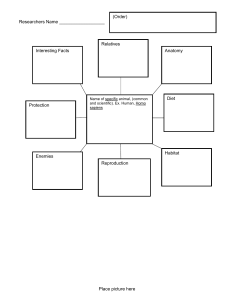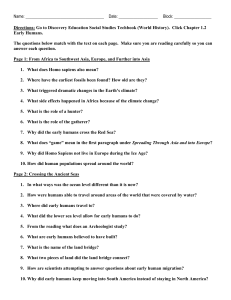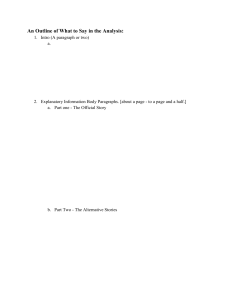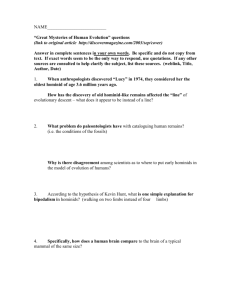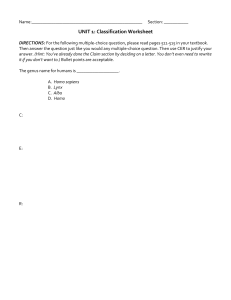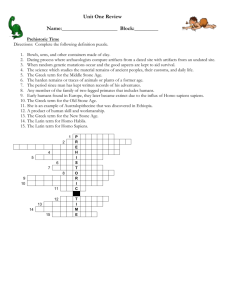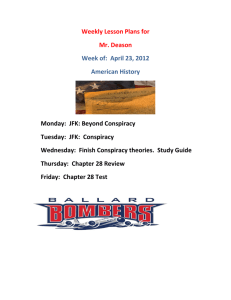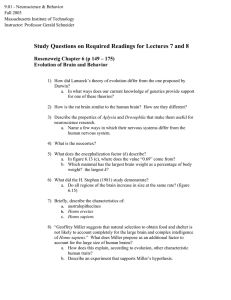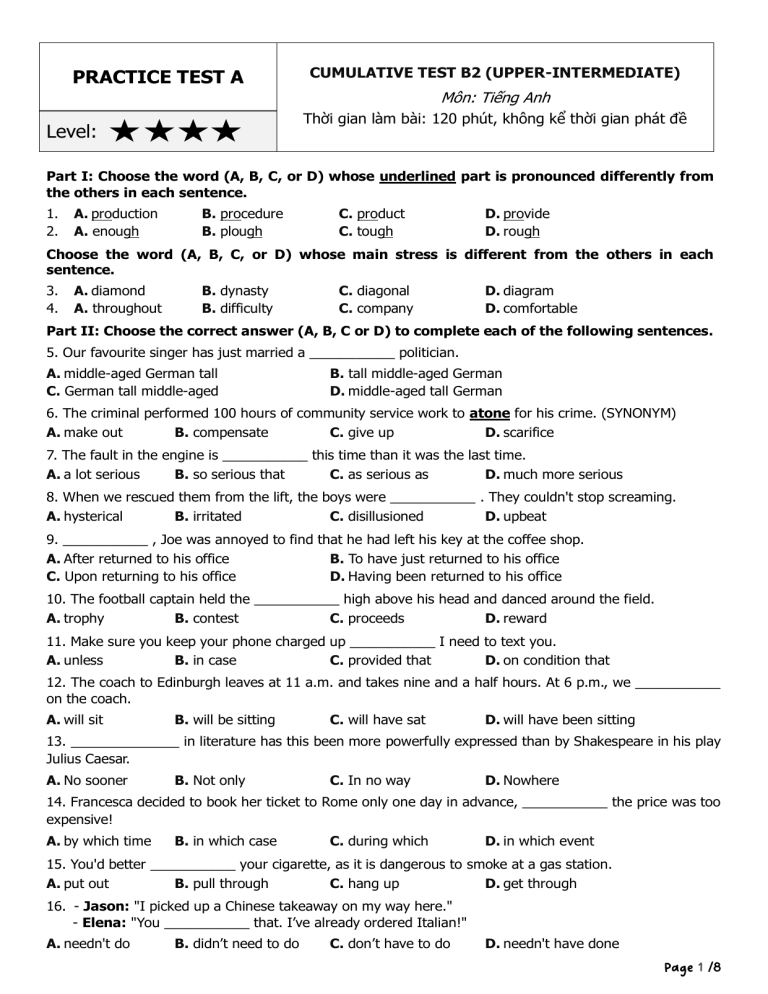
PRACTICE TEST A CUMULATIVE TEST B2 (UPPER-INTERMEDIATE) Môn: Tiếng Anh Thời gian làm bài: 120 phút, không kể thời gian phát đề Level: Part I: Choose the word (A, B, C, or D) whose underlined part is pronounced differently from the others in each sentence. 1. 2. A. production A. enough B. procedure B. plough C. product C. tough D. provide D. rough Choose the word (A, B, C, or D) whose main stress is different from the others in each sentence. 3. 4. A. diamond A. throughout B. dynasty B. difficulty C. diagonal C. company D. diagram D. comfortable Part II: Choose the correct answer (A, B, C or D) to complete each of the following sentences. 5. Our favourite singer has just married a ___________ politician. A. middle-aged German tall C. German tall middle-aged B. tall middle-aged German D. middle-aged tall German 6. The criminal performed 100 hours of community service work to atone for his crime. (SYNONYM) A. make out B. compensate C. give up D. scarifice 7. The fault in the engine is ___________ this time than it was the last time. A. a lot serious B. so serious that C. as serious as D. much more serious 8. When we rescued them from the lift, the boys were ___________ . They couldn't stop screaming. A. hysterical B. irritated C. disillusioned D. upbeat 9. ___________ , Joe was annoyed to find that he had left his key at the coffee shop. A. After returned to his office B. To have just returned to his office C. Upon returning to his office D. Having been returned to his office 10. The football captain held the ___________ high above his head and danced around the field. A. trophy B. contest C. proceeds D. reward 11. Make sure you keep your phone charged up ___________ I need to text you. A. unless B. in case C. provided that D. on condition that 12. The coach to Edinburgh leaves at 11 a.m. and takes nine and a half hours. At 6 p.m., we ___________ on the coach. A. will sit B. will be sitting C. will have sat D. will have been sitting 13. ______________ in literature has this been more powerfully expressed than by Shakespeare in his play Julius Caesar. A. No sooner B. Not only C. In no way D. Nowhere 14. Francesca decided to book her ticket to Rome only one day in advance, ___________ the price was too expensive! A. by which time B. in which case C. during which D. in which event 15. You'd better ___________ your cigarette, as it is dangerous to smoke at a gas station. A. put out B. pull through C. hang up D. get through 16. - Jason: "I picked up a Chinese takeaway on my way here." - Elena: "You ___________ that. I’ve already ordered Italian!" A. needn't do B. didn’t need to do C. don’t have to do D. needn't have done Page 1 /8 Part III: Error Recognition A. Choose a word or phrase (A, B, C or D) that needs correcting. 17. Mr. John started as a salesman, then he went on to become a manager, finally finished his career as chairman of the board. A. as a C. finally finished B. went on D. chairman of the board 18. The most aggressive bees known, the African honeybee, is currently swarming into North America. A. most aggressive C. currently swarming B. bees D. into 19. For an area that is supposed to have a temperate climate, it was an especially hot and humidity day today. A. is supposed C. an especially B. a temperate climate D. humidity 20. The discovery of the antibiotic penicillin in 1928 has not produced antibiotics useful for the treatment of infectious diseases until 1940. A. discovery C. useful B. has not produced D. infectious B. Identify 8 errors in the following dialogue (an unnecessary word, a word missing or an incorrect word) and write the corrections. 1 Kim: I think I’ll choose to volunteer abroad for my gap year, mainly is because I want to work for a charity when I leave university. 2 Jo: That’s a great way to try out new experiences and see the sights of a different country. 3 Kim: Yeah, the better option would be an environmental project I’ve found in Chile because they provide accommodation and transport. 4 Jo: And the geography is so diverse there too; you’ll learn a lot. I’m going opting for backpacking around India. 5 Kim: Are you going to take it easy on the beaches or get off the beating track and explore? 6 Jo: I’m definitely going to soak in the sun on those beautiful beaches. But I want to broaden my horizons too and perhaps find some volunteer work when I get there. 7 Kim: Personally, I wouldn’t pick on the well-known beaches, as they get very overcrowded. 8 Jo: You’re right. I wouldn’t go for the tourist hotspots for the reason that I want to get away with it all. 9 Kim: It’s incredible to think that this time next year, I’ll be trekking in the Andes! 10 Jo: And I might be sleeping roughly next to a campfire on a remote beach! Line Mistake Correction 21. 22. 23. 24. 25. 26. 27. 28. Page 2 /8 Part IV: WORD FORMATION A. Complete each sentence, using the correct form of the word in parentheses. 29. 30. 31. 32. My boss is not very ____________ to advice given by his employees. (RESPOND) When her uncle passed away, Sarah’s ____________ included several valuable oil paintings. (INHERIT) He shouldn't have said that. I think his comment was totally ____________ . (APPROPRIATE) Stop being so ____________ . You have to disagree with everything, don't you? (ARGUE) 33. The leader of the trade union tried _____________ for re-election before finally retiring after 27 years. (SUCCESS) 34. You can accuse me of anything but _____________ . I have always supported you! (LOYAL) B. Complete the following passage with the correct form of the words in brackets. One of the greatest demonstrations in history was the 1930 Salt March in India. At the time, there was no ____________ (35. DEMOCRACY) rule in the country as it was governed by the British. Most government policies were _____________ (36. RACE) because they favoured British citizens over Indians. Civil rights activist Mahatma Gandhi was the leader in the campaign against this ____________ (37. EQUAL) and he chose Britain’s Salt Acts as a symbol for the ____________ (38. JUST) of the system. These laws prohibited Indians from collecting or selling salt and forced them to buy it from the British. Gandhi’s first act was the organization of a peaceful march from his hometown to the coast, where he would collect salt. On 12 March, he set off with less than a hundred ____________ (39. PROTEST). Along the way, people listened to his ______________ (40. SPEAK) at the meetings he held. Many of them sympathized with the cause, and by the time he reached the coast on 5 April, the crowd had swollen to tens of thousands. Although 60,000 arrests were made – including Gandhi himself – the march was successful in raising awareness of the Civil Disobedience Movement. India was finally granted independence in August 1947. Write your answers here: 35. ________________ 36. ________________ 37. ________________ 38. ________________ 39. ________________ 40. ________________ Part V: Complete the sentences. Use the correct form of the verbs in brackets. 41. Last semester’s class was too large. I ________________ (ought to / divide) in half. 42. Ben couldn't remember if he _______________ (turn off) the lights in the garage before he left. 43. We _______________ (drive) for about an hour when the car started making funny noises. 44. Most students _______________ (complete) the project on nanotechnology by the end of next week. 45. “How long ____________ you _______________ (wait) for the bus?” — “Only about five minutes.” 46. It has been really hard to concentrate today. I ______________ (not stay) up late last night. 47. On checking the bill, I noticed we _______________ (not charge) for our drinks. 48. Oxfam is a world leader in delivering emergency relief. If it weren’t for this charity, thousands of children in Europe would have gone hungry during World War II. Today, desperate people wouldn’t have clean water if Oxfam hadn’t made this a priority during humanitarian disasters. And if it _______________ (not be) for Oxfam, the NGO ActionAid might, not exist either; there wouldn’t be so much pressure on governments to provide healthcare and education and to combat climate change if these charities _______________ (not develop). But Oxfam might not be so successful nowadays if it _______________ (not recognize) the importance of linking business with charity. Page 3 /8 Part VI: GUIDED CLOZE TEST A. Read the following passages and choose the options that best complete the blanks. PASSAGE 1 If you are like me, you may well have needed to get someone to explain certain technology to you at some point. Recently, much (49) ___________ about the speed with which technology changes, and the impact that is felt by people as a result. Take the smartphone as an example. It seems that just as we have become used to the latest model, a new and improved one is waiting to take its place. This can leave many of us feeling that we are missing out on something if we do not have it. And indeed (50) ___________ of us rush out to the shops, it seems, (51) ___________ time a new model appears, simply because we are not willing (52) ___________ . But we should ask ourselves if a phone that is only a year old does not have enough features to keep us happy? A lot (53) ___________ about consumer behaviour from this current trend. For one thing, it tells us that people are happy to stop (54) ___________ older models and just replace them with something new, whereas older generations kept something until it eventually broke and died! 49. A. will be written 50. A. much 51. A. either B. has been written C. had been written B. many C. both B. neither C. some D. will have been written D. all D. each 52. A. waiting 53. A. will be learned 54. A. to use B. wait B. can be learned B. using D. to wait D. might have been learned D. having used C. not waiting C. had been learned C. use B. Read the text about the history of the vacuum cleaner and choose the options that best complete the blanks. PASSAGE 2 Until about 250 years ago, households did not take dirt as (55) ____________ as they do now. It was a fact of life and that was that. Cleaning often (56) ___________ of no more than an annual clean called ‘spring-cleaning’. This was when the furniture was moved aside, and the other objects in the house, such as curtains, were cleaned. Carpets and rugs were taken outside, hung on ropes, and had the dust (57) ___________ out of them. It was an exhausting and messy process. The industrial revolution brought about a major change. As new (58) ____________ became available to make homes cleaner, a corresponding interest in domestic hygiene developed. This, in turn, led to the (59) ____________ of new machines, one of which was the vacuum cleaner. Legend has it that when one of the first vacuum cleaners was demonstrated, a kindly scientist took the proud inventor aside, offering a bit of advice that was to become crucial to the future of the product – ‘make it suck, not blow’. The first vacuum cleaners appeared in the USA. They were operated by hand pumps and were almost as much hard work as spring-cleaning. It was only when electric motors had become sufficiently (60) _____________ to be moved around that vacuum cleaners became common household items. Most of today’s major brands first appeared in the 1920s, but have had their designs changed slightly through the decades. Page 4 /8 55. A. importantly 56. A. consisted B. crucially B. made C. seriously C. included D. considerately D. meant 57. A. beaten B. sucked C. taken D. cleaned 58. A. ideals B. creations C. inventions D. inspirations 59. A. appearing 60. A. scientific B. establishment B. advanced C. manufacture C. forward D. planning D. technological Part VII: READING COMPREHENSION A. Read the following passages carefully and circle (A, B, C or D) that best answers the questions. CONSPIRACY THEORISTS Did Neil Armstrong indeed walk on the moon in 1969, or was the event filmed in a TV studio? Was the American president John F. Kennedy assassinated by a lone gunman in 1963, or was it all a complicated plot involving Vice-President, Lyndon Johnson? When it comes to major events such as moon landings or assassinations, the deaths of celebrities, or deadly terrorist bombings, the only thing we can count on is that thousands of people online will refuse to accept the obvious true story behind each event, and will look for a stranger, more exciting explanations. These are the conspiracy theorists, and there are more of them than you would think. In some polls, one-fifth of the American population genuinely believe that nobody went to the moon in 1969 and that Kennedy died on the orders of his Vice-President. For social scientists, the interesting question is why people are so quick to believe conspiracy theories. For many years, these scientists believed the phenomenon was a form of paranoia. People who accused the government of a cover-up, or blamed aliens for causing a disaster were described as part of a small minority of people with a form of mental illness. While this may frankly be true for a few individuals, it clearly has its limitations as a theory, to my mind at least. It doesn’t explain, for example, why so many people admit to searching for unusual reasons behind events. Millions of us do this! Since not everybody is mentally ill, social scientists are now looking for a better explanation for the public’s love of conspiracy theories. Research has shown that people believe in conspiracy theories for a variety of reasons. One is that they don’t trust official explanations. We live in a world in which we are used to being misled. Advertising agencies are always telling us something is true when it clearly isn’t, companies we rely on, such as gas and electricity suppliers, are not always straight with us, and we know politicians regularly exaggerate the positive things they achieve. Against this background, it is not surprising that people don’t accept what they are officially told. Moreover, people are also influenced by their own ideological beliefs to interpret events in particular ways. So, for example, people who strongly believe that bankers are untrustworthy may interpret a decline in the economy as a terrible plan by bankers to make themselves rich. A further explanation for believing in conspiracies is that most ordinary people feel powerless and insecure. We don’t like to face the truth that terrible things do sometimes take place. Instead, we create a conspiracy theory as a way of explaining something so that it makes sense to us. 61. In the opening paragraph, which of the following does the writer provide? A. Reasons why people tend to believe in conspiracy theories. B. Data to show that conspiracy theories are often believed. C. Examples of events that have now been shown to be hoaxes. D. Information about the sort of people who become conspiracy theorists. Page 5 /8 62. Which of the following is stated as a fact by the writer in paragraph 2? A. Social scientists are typical of the sort of people who believe conspiracy theories. B. Many social scientists continue to believe that most conspiracy theorists have a form of paranoia. C. Only a very small proportion of people in society are conspiracy theorists. D. The idea that conspiracy theorists have mental health problems is no longer accepted by a majority of experts. 63. Which of the following is stated as an opinion by the writer in paragraph 2? A. It seems unlikely that a majority of conspiracy theorists are victims of paranoia. B. It is improbable that there are so many conspiracy theorists in society. C. It seems impossible that any conspiracy theorist could be mentally ill. D. It is possible that some conspiracy theorists are right to be concerned. 64. The word “exaggerate” in the third passage is closest in meaning to ____________ . A. overstate B. inflate C. accentuate D. lay it on thick 65. In paragraph 3, the writer provides examples of people who deceive us in everyday life. Which group of people is not mentioned in the passage? A. officials in the armed services B. people who represent us in government C. energy providers D. people who make commercials 66. Which one of the following reasons why people become conspiracy theorists is mentioned by the writer? A. People are naturally creative when it comes to interpreting events. B. It’s a way of influencing other people to think differently. C. People are unable to accept what those in power tell them. D. It’s a means of gaining publicity for your own views. B. Read the text about the early development of the human brain, then do the tasks below: • Complete the summary with a word from the box. There are four words that you do not need to use. planning hunting quantity complexity power territory gossiping people tools Scientists generally agree that human language developed out of the need to share information. However, they disagree concerning which type of information was the most important. Some think that humans first used language to discuss (67) ____________ or how to avoid danger. Others, however, think that sharing information about (68) ______________ was more important. (69) ______________ seems to have been the main function of early language. Although this idea may appear unlikely, there is plenty of evidence to support it. Even for small groups, the (70) ______________ of such information was considerable. Acquiring it enabled human societies to increase in size and (71) ______________ . Page 6 /8 The development of the brain in early humans Although our ancestors, Homo sapiens, had already populated East Africa 150,000 years ago, they began to spread across the rest of the earth and drive out other species only about 70,000 years ago. Until then, even though these ancestors looked just like us, and their brains were as big as ours, they did not enjoy any marked advantage over the other human species that existed at that time. In addition, they did not produce particularly sophisticated tools and did not accomplish any other special feats. This lack of achievement has led scientists to speculate that the internal structure of the brain of Homo sapiens was probably different from ours. They looked like us, but their cognitive abilities – learning, remembering, communicating – were far more limited. communicate in sophisticated ways, informing one another of the whereabouts of food. Neither was it the first language involving the use of a voice. Many animals, including all ape and monkey species, have vocal languages. For example, green monkeys use calls of various kinds to communicate. Scientists have identified one call that means ‘Careful! An eagle!’ A slightly different call warns, ‘Careful! A lion!’ Homo sapiens can produce many more distinct sounds than green monkeys, but whales and elephants have equally impressive abilities. A parrot can say anything a person could say, as well as mimic the sounds of phones ringing, doors slamming, and police cars with their sirens switched on. What, then, is so special about our language? But then, beginning about 70,000 years ago, Homo sapiens started doing truthfully unusual things. Around that date, bands of Homo sapiens left Africa for a second time. This time they drove all other human species from the face of the earth. Within a remarkably short period, our ancestors reached Europe and East Asia. About 45,000 years ago, they somehow crossed the open sea and landed in Australia – a continent untouched by humans until then. The period from about 70,000 years ago to about 30,000 years ago witnessed the invention of boats, oil lamps, bows and arrows, and needles (essential for sewing warm clothing). The first objects that can reliably be called art also date from this era, as does the first clear evidence for religion, commerce, and social organization. The most common answer is that our language is amazingly flexible. We can connect a limited number of sounds and signs to produce an infinite number of sentences, each with a distinct meaning. Therefore, we can take in, store and communicate an enormous amount of information about the surrounding world. A green monkey can yell to its comrades, ‘Careful! A lion!’ But a modern human can tell her friends that this morning, near the bend in a river, she saw a lion tracking a herd of bison. She can then describe the exact location, including the different paths leading to the area. With this information, the members of her group can discuss whether they should approach the river, chase away the lion, and hunt the bison themselves. The majority of researchers believe that these unprecedented accomplishments were the product of a revolution in Homo sapiens’ cognitive abilities. They maintain that the people who drove the Neanderthals to extinction settled in Australia and carved the ivory figure of a lion-man found in a cave in Germany were as intelligent, creative, and sensitive as we are. The appearance of new ways of thinking, and communicating, between 70,000 and 30,000 years ago constitutes the Cognitive Revolution. We are not sure what caused it. The most commonly believed theory argues that accidental genetic changes altered the inner wiring of the brains of Homo sapiens, enabling them to think in new ways, and to communicate using an altogether new type of language. Why did it occur in Homo sapiens rather than in other species, like Neanderthals? It was just a matter of pure chance, as far as we can tell. But it's more important to understand the consequences of this change than its causes. What was so special about Homo sapiens’ new language that it enabled us to conquer the world? It was not the first language; every animal has some kind of language. Even insects, such as bees and ants, know how to A second theory agrees that our unique language evolved as a means of sharing information about the world. But according to this theory, the most important information that needed to be conveyed was about humans, not about lions and bison: our language evolved as a way of gossiping. Homo sapiens is chiefly a social animal, and social cooperation is our key to survival. It is not enough for men and women to know the whereabouts of lions and bison. It is much more important for them to know who in their group hates whom, who is sleeping with whom, who is honest, and who is a cheat. The amount of information that one must obtain and remember, to track the ever-changing relationships of even a small number of individuals, is huge. All apes show a keen interest in such social information, but they have trouble gossiping effectively. The new linguistic skills that Homo sapiens acquired about seventy millennia ago enabled them to gossip for hours on end. Reliable information about who could be trusted meant that small groups could expand into larger groups, and Homo sapiens could develop tighter and more sophisticated types of cooperation. The gossip theory might sound like a joke, but numerous studies confirm it. • Do the following statements agree with the claims made in Text B? In boxes 72 – 77 on your answer sheet write: Page 7 /8 YES NO NOT GIVEN if the statement agrees with the claims of the writer if the statement contradicts the claims of the writer if it is impossible to say what the writer thinks about this 72. There is evidence that Homo sapiens were very creative between 70,000 and 30,000 years ago. 73. The great improvements in Homo sapiens' thinking ability between 70,000 and 30,000 years ago were due to luck. 74. The reasons for the Cognitive Revolution are more worthy of investigation than the results. 75. Compared to other monkey species, the green monkey expresses a wider range of meanings in its calls. 76. The vocal features of human language are generally superior to the verbal features of other animals’ languages. 77. Warnings are the most common function of non-human language. Write your answers here: 72. ________________ 73. ________________ 74. ________________ 75. ________________ 76. ________________ 77. ________________ Part VIII: SENTENCE TRANSFORMATION A. Finish each of the following sentences in such a way that it is as similar as possible in meaning to the sentence printed before it. 78. Sam made a good impression on the judges and she earned a place on the talent show. → If Sam .…………………………………………………………………………………………………………………………………… 79. The tree fell across the road. It had been uprooted by the storm. (PARTICIPLE CLAUSE) → ………………………….…………………………………………………………………………………………………………………… 80. "If you keep coming to work late, you'll be in trouble," Ralph’s boss said. → Ralph’s boss warned ……….……………………………………………………………………..………………………………… 81. My ex-colleague has started up his own business. He is Spanish. (RELATIVE CLAUSE) → ………………………….…………………………………………………………………………………………………………………… 82. You should not walk around in that neighborhood after dark on any account. (INVERSION) → ………………………….…………………………………………………………………………………………………………………… 83. Peter didn't like the idea of going for a walk. His wife seemed quite unwilling too. → Neither Peter ………..………………………………………………………………………………………………………………… B. Complete the second sentence so that it has a similar meaning to the first one. Use the word given in the block letter, and this word must not be changed in any way. 84. In order to make more friends, you will have to be more patient. (BEING) → Only by ………….…………………………………………………….……………………………….…… make more friends. 85. Danny is very disappointed that he lost the important tennis match on Saturday. (LOSING) → Danny hasn’t got over the ………………….………………………………………………………………… the important tennis match on Saturday. 86. Please arrange for these parcels to be posted as soon as possible. (HAVE) → Please ………………….…………………………………………………….……………………………… as soon as possible. 87. Joanna decided that using an out-of-date website for her school project was pointless. (POINT) → Joanna decided that there ……………….…………….………………….………………………………… an out-of-date website for her school project. 88. It took Steve five hours to realize that the engine could not be repaired. (WORKING) → Steve ………………….…………………………………….….………….……… five hours before he realized that the engine could not be repaired. THE END. Page 8 /8
